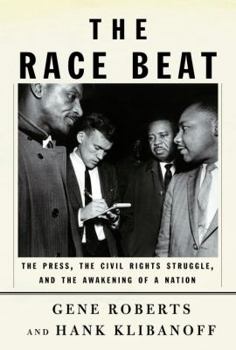The Race Beat: The Press, the Civil Rights Struggle, and the Awakening of a Nation
Select Format
Select Condition 
Book Overview
An unprecedented examination of how news stories, editorials and photographs in the American press--and the journalists responsible for them--profoundly changed the nation's thinking about civil... This description may be from another edition of this product.
Format:Hardcover
Language:English
ISBN:0679403817
ISBN13:9780679403814
Release Date:October 2006
Publisher:Alfred A. Knopf
Length:518 Pages
Weight:1.87 lbs.
Dimensions:1.6" x 6.6" x 9.3"
Customer Reviews
5 ratings
one of the very best
Published by Thriftbooks.com User , 15 years ago
I read this book when it first came out and knew right away it was one of the very best I had ever read. Other reviewers have done an excellent job of pointing out many of the book's virtues, but I wish to call attention to one other. When Emmit Till's battered body was sent home, his mother demanded that his casket be open so that everyone could see the cruel mutilation he had suffered. More important--for historical purposes--she allowed his body to be photographed by JET and EBONY, the two black magazines with national circulation. The result was that for the first time white Americans had to look directly at a horrific truth they had been able until then to ignore. Ironically, it was at the trial of Emmit Till's accused murderers that the white press took over the civil rights story. Mrs. Till deserves more honor than she has received; her courage changed history. I wish I could give the book ten stars.
Excellent
Published by Thriftbooks.com User , 15 years ago
At its heart, The Race Beat is a thoroughly researched, well-written explanation of how democracy and justice cannot survive without a free, vigilant press. Yet, the book is hardly a benediction of the American news media: One of the core conflicts throughout is how conservative Southern editors, publishers and station owners collaborated with segregationist politicians and white civic groups. While a few editors in the Deep South braved public backlash, canceled subscriptions and death threats to do the right thing, most did not. Some, like The Clarion-Ledger of Jackson, Mississippi, made it their mission to undo the civil rights movement. That paper, for instance, placed a photo of some litter found on a D.C. street the day after Martin Luther King's famous march on Washington, giving it the headline, "Washington Is Free From Trash." (It would be another two decades or so before The Clarion-Ledger would exorcise its racial demons.) That's just one of many nauseating episodes described in The Race Beat in which many Southern media fought against justice instead of protecting it. And Roberts and Klibanoff do a tremendous job of telling the story of the storytellers, and bringing them to life, warts and all, across two pivotal decades, give or take. If I have one criticism, it's that the last two chapters are a little rushed. The signing of the Civil Rights Act of 1964 marks the book's climax, and the subsequent tumult -- including race riots in the North and the assassination of Martin Luther King -- gets just two, relatively brief chapters. The book is about 450 pages if you don't count the extensive bibliography and acknowledgments. It wouldn't have hurt to give it another hundred pages. But overall, The Race Beat is a remarkable achievement. It's an absolute must-read for every journalist and is highly-recommended for anyone else.
An excellent argument for the importance of a free press.
Published by Thriftbooks.com User , 16 years ago
To me, this book was less a civil right's history, though that certainly serves as an excellent backdrop, but more of a detailed account showing the unsurpassed importance of free speach and a free press to the cause of liberty and democracy. It serves to illustrate the power of the truth, and although America's treatment as a whole of blacks has been shameful until just recently, it makes me proud to be an American where the entire social order can change without violent revolution.
Absorbing and instructive
Published by Thriftbooks.com User , 17 years ago
I have read a lot on the civil rights struggle, including Taylor Branch's trilogy, and Simple Justice, by Richard Kluger, and have appreciated all the reading I have done on that momentous struggle. But this account of how newspapers and television chronicled the exciting events told me a lot I did not know or had not remembered. The book is carefully footnoted and has a 26 page bibliography, in addition to the footnotes (thus avoiding the unfortunate lapse of some books which are well-footnoted but omit a bibliography). The book not only tells of newsmen and media sometimes going to great, even heroic lengths, to tell the story of the events in the clash between aspring blacks and the status quo, but also tells of the media which sought to uphold segregation. As with other books on the struggle, when one is appalled by the violence and murders which marked the history, it is some comfort to realize that in the end right triumphs. This book is an astoundingly interesting survey of an important aspect of the civil rights efforts of the 1950s and 1960s.
Winner of the 2007 Pulitzer Prize for History
Published by Thriftbooks.com User , 17 years ago
Outstanding effort by legendary editor Gene Roberts, widely admired for turning around the Philadelphia Inquirer in the 1980s and leading it to multiple prizes in journalism, revisits, with co-author Hank Klibanoff, managing editor of the Atlanta Journal-Constitution, both their own work in civil rights reporting and the work of colleagues to pen this precise and most interesting study of what journalists were and weren't doing when segregation was legal in the U.S. Highly readable and fascinating history.





